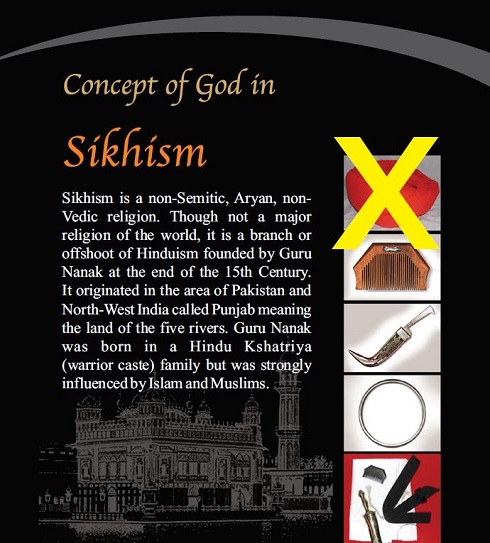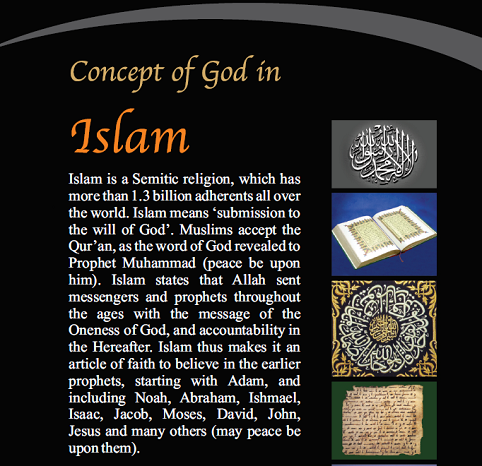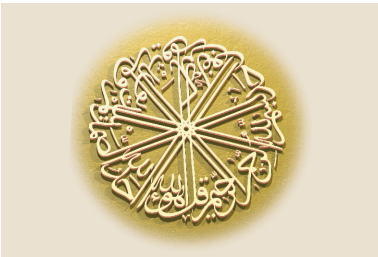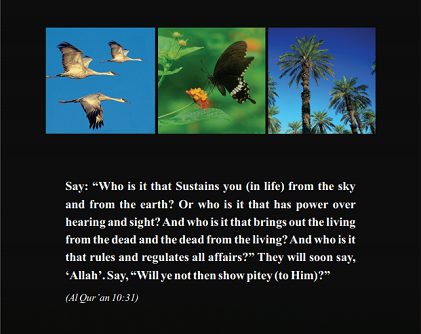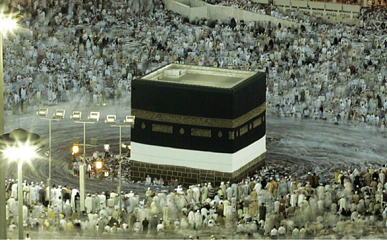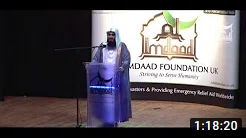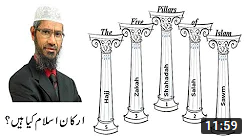First we shall discuss the Concept of God in Hinduism
Surah Al Ikhlaas - The touchstone of theology
Surah Al Ikhlaas (Chapter 112) of Glorious Qur’an, is the touchstone of theology. ‘Theo’ in Greek means ‘God’ and ‘logy’ means ‘study’. Thus, ‘Theology’ means ‘study of God’ and to Muslims this four-line definition of Almighty God serves as the touchstone of the study of the concept of God. Any candidate to divinity must be subjected to this ‘acid test’. Since the attributes of Allah given in this chapter are unique, these verses can be used to easily dismiss false Gods and pretenders to divinity
What does Islam say about ‘god-men’?
India is often called the land of ‘god-men’. This is due to the abundance of so-called spiritual masters in India. Many of these ‘babas’ and ‘saints’ have a large following in many countries. Islam abhors deification of any human being or any entity
To understand the Islamic stand towards such pretenders to divinity, let us analyze one such ‘god-man’, Osho Rajneesh. Rajneesh was one among the multitude of ‘spiritual teachers’ produced by India
To understand the Islamic stand towards such pretenders to divinity, let us analyze one such ‘god-man’, Osho Rajneesh. Rajneesh was one among the multitude of ‘spiritual teachers’ produced by India
Let us put this candidate to divinity, Bhagwan Rajneesh, to the test of Surah Al Ikhlaas, the touchstone of theology:
(i) The first criterion is “Say, He is Allah, One and Only.” Is Rajneesh one and only? No! There are many people like Rajneesh who claim divinity. Some disciples of Rajneesh may still hold that Rajneesh is one and only.
(ii) The second criterion is, ‘Allah is Absolute and Eternal’. Rajneesh was surely not absolute and eternal. He died in 1990. We know from his biography that he suffered from diabetes, asthma and chronic backache. He alleged that the US Government gave him slow poison in jail. Imagine Almighty God being poisoned! Rajneesh was neither absolute nor eternal.
(iii) The third criterion is ‘He begets not, nor is He begotten’. We know that Rajneesh was born in Jabalpur in India and had a mother as well as a father who later became his disciples.
In May 1981, he went to the United States and established a town called ‘Rajneeshpuram’. He later fell foul of the US and was arrested and asked to leave the country. He came back to India and started a commune in Pune which is now known as the ‘Osho Commune’. He died in 1990. The followers of Osho Rajneesh believe that he is Almighty God. A visitor to the ‘Osho Commune’ in Pune will find the following epitaph on his tombstone:
“Osho - never born, never died; only visited planet earth between 11th December 1931 to 19th January 1990.”
They forgot to mention that he was not given visa for 21 different countries of the world. The followers of Rajneesh see no problem in their ‘god’visiting the earth and requiring a visa to enter a country. Imagine, God needing a visa to visit any part of his created planet!
The Archbishop of Greece said that if Rajneesh had not been deported, they would have burnt his house and those of his disciples
(iv) The fourth test, which is the most stringent, is “There is none like unto Him.” The moment you imagine ‘God’ or compare ‘God’ to anything then he (the candidate to divinity) is not God. It is not possible to conjure up a mental picture of the One True God. We know that Rajneesh was a human being with a white flowing beard. He had two eyes, two ears, one nose and one mouth. Photographs and posters of Rajneesh are available in plenty. The moment you imagine what god is, that imagined entity is not God.
Many are tempted to make anthropomorphic comparisons of God. Take for instance, Arnold Schwarzenegger the famous body builder and Hollywood Actor who was given the title of ‘Mr Universe’, the strongest man in the world. Let us suppose that someone says that Almighty God is a thousand times stronger than Arnold Schwarzenegger. The moment

you compare any entity to God, whether the comparison is to Arnold Schwarzenegger or to King Kong, whether it is a thousand times or a million times stronger, it fails the Qur’anic criterion, “There is none like unto Him.”
Thus, the ‘acid test’ cannot be passed by anyone except the One True God.
The following verse of the Glorious Qur’an conveys a similar message:
“No vision can grasp Him.
But His grasp is over all vision:
He is above all comprehension,
Yet is acquainted with all things.”
(Al Qur’an 6:103)
What is the concluding remark to this section of ‘acid test’? This acid test cannot be passed by anyone except the One true God
By what name do we call God?
Muslims prefer calling the Supreme Creator, Allah, instead of the English word ‘God’. The Arabic word, ‘Allah’, is pure and unique, unlike the English word ‘God’, which can be played around with.
If you add ‘s’ to the word ‘God’, it becomes ‘Gods’, that is the plural of God. Allah is one and singular, there is no plural of Allah. If you add ‘dess’ to the word ‘God’, it becomes ‘Goddess’ that is a female God. There is nothing like male Allah or female Allah. Allah has no gender. If you pre-fix ‘tin’ before the word ‘God’, it becomes ‘tin-God’ i.e., fake God. Allah is a unique word, which does not conjure up any mental picture nor can it be played around with. Therefore, the Muslims prefer saying ‘Allah’, but sometimes while speaking to the non-Muslims we may have to use the inappropriate word ‘God’ for Allah. Since the intended audience of this book is general in nature, consisting of both Muslims as well as non-Muslims, I have used the word ‘God’ instead of Allah in several places in this book
God does not become a human being
Some people argue that God can do everything, then why cannot He take a human form? They contend that if God wishes He can become a human being. But then He no longer remains God because the qualities of God and human beings in many respects are completely incompatible. The following paragraphs will show the absurdity of the idea of God becoming a human being.
God is immortal and human beings are mortal. You cannot have a God-man i.e. an immortal being and a mortal being at the same time and in the same entity. It is meaningless. God does not have a beginning while human beings have a beginning. You cannot have a person, not having a beginning and at the same time having a beginning. God does not have an end while human beings have an end. You cannot have a being, which has no end and yet have an end at the same time. It is meaningless.
Almighty God does not require to eat whereas human beings require nourishment to sustain life.
“And He it is that feedeth but is not fed.”
(Al Qur’an 6:14)
God does not require rest or sleep while human beings cannot go indefinitely without rest.
“Allah! There is no god but He - the Living, the SelfSubsisting, Eternal. No slumber can seize Him nor sleep. His are all things in the heavens and on the earth.”
(Al Qur’an 2:255)
Worship of another human is useless
If the idea of God becoming human is unacceptable, we must also agree that there is therefore no sense in worshiping another human. If God takes a human form, He ceases to be God and possesses all the qualities of a human. For example, if a brilliant professor meets with an accident and suffers irreparable loss of memory, it would be foolish on the part of his students to continue to take lessons from him in his subject.
Moreover, if God takes a human form, the same human cannot later become God, since human beings, by definition, do not possess the power to become God. The worship of God in a human form is therefore a logical fallacy and should be abhorred in all its forms
That is the reason why the Glorious Qur’an speaks against all forms of anthropomorphism. The Glorious Qur’an says in the following verse:
“There is nothing whatever like unto Him, and He is the One that hears and sees (all things).”
(Al Qur’an 42:11)
God does not perform ungodly acts
The attributes of Almighty God preclude any evil since God is the fountainhead of justice, mercy and truth. God can never be thought of as doing an ungodly act. Hence we cannot imagine God telling a lie, being unjust, making a mistake, forgetting things and such other human failings. Similarly, God cannot be unjust because being unjust is an ungodly act.
The Glorious Qur’an says:
“Allah is never unjust in the least degree.”
(Al Qur’an 4:40)
God can be unjust if he wants, but the moment God does injustice, He ceases to be God.
God does not forget nor does He make mistakes
God will not forget anything because forgetting is an ungodly act, which reeks of human limitations and failings.
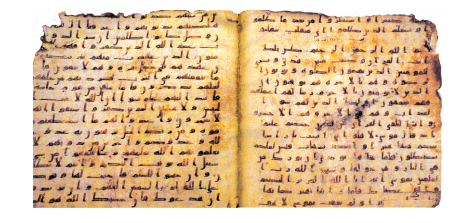
Similarly God will not make a mistake, because making mistakes is an ungodly act.
“...my Lord never errs, nor forgets.”
(Al Qur’an 20:52)
God performs Godly acts
The Islamic concept of God is that God has power over all things. The Glorious Qur’an says in several places:
“For Allah has power over all things.”
(Al Qur’an 2:106, 2:109, 2:284, 3:29, 16:77 and 35:1)
Further the Glorious Qur’an says:
“Doer (without let) of all that He intends.”
(Al Qur’an 85:16)
We must keep in mind that Allah intends only Godly acts and not ungodly acts.
Many religions at some point believe, directly or indirectly in the philosophy of anthropomorphism i.e. God becoming a human. Their contention is that Almighty God is so pure and holy that He is unaware of the hardships, shortcomings and feelings of human beings. In order to set the rules for human beings, He came down to earth in the form of a human. This deceptive logic has fooled countless millions through the ages. Let us now analyze this argument and see if it stands to reason.
The Creator prepares the instruction manual
Allah (swt) has endowed us humans with reason and intelligence. We invent and manufacture appliances for specific purposes. DVD players for instance are manufactured in large numbers . It has never been suggested that in order to understand what is good for the DVD player, the manufacturer should become a DVD player himself. One simply assumes that the manufacturer will publish an instruction manual, since he has complete knowledge of his product. In short, the instruction manual gives the do’s and don’ts for the machine or the equipment.
If you think of the human being as a machine, it is indeed a complex creation of Allah (swt). Our Lord and Creator, Allah (swt), need not come in the form of a human being to know what is good or bad for the human beings. He only has to reveal the instruction manual to mankind. The Glorious Qur’an is the instruction manual for human beings.
Moreover, Allah will call this creation to account on the Day of Judgement. It therefore stands to reason, that the Creator informs us about the do’s and don’ts of life.
Allah chooses Messengers
Allah (swt) need not come down personally for writing the instruction manual. Over the ages Allah has chosen men in every nation to deliver the Divine message. Such chosen men are called as messengers and prophets of God.
Some people are ‘blind’ and ‘deaf’
Despite the absurdity of the philosophy of anthropomorphism, followers of many religions believe in and preach it to others. Is it not an insult to human intelligence and to the Creator who gave us this intelligence? Such people are truly ‘deaf’and ‘blind’despite the faculty of hearing and sight given to them by Allah. He says:
“Deaf, dumb, and blind, they will not return (to the path).”
(Al Qur’an 2:18)
(to the path).” (Al Qur’an 2:18) The Bible gives a similar message in the Gospel of Matthew:
“... they seeing see not; and hearing they hear not, neither do they understand.”
Asimilar message is also given in the Hindu Scriptures in the Rigveda:
“There may be someone who sees the words and yet indeed do not see them; may be another one who hears these words but indeed does not hear them”
(Rigveda 10:71:4)
All these Scriptures are telling its reader that though the things are made so clear yet they divert away from the truth.
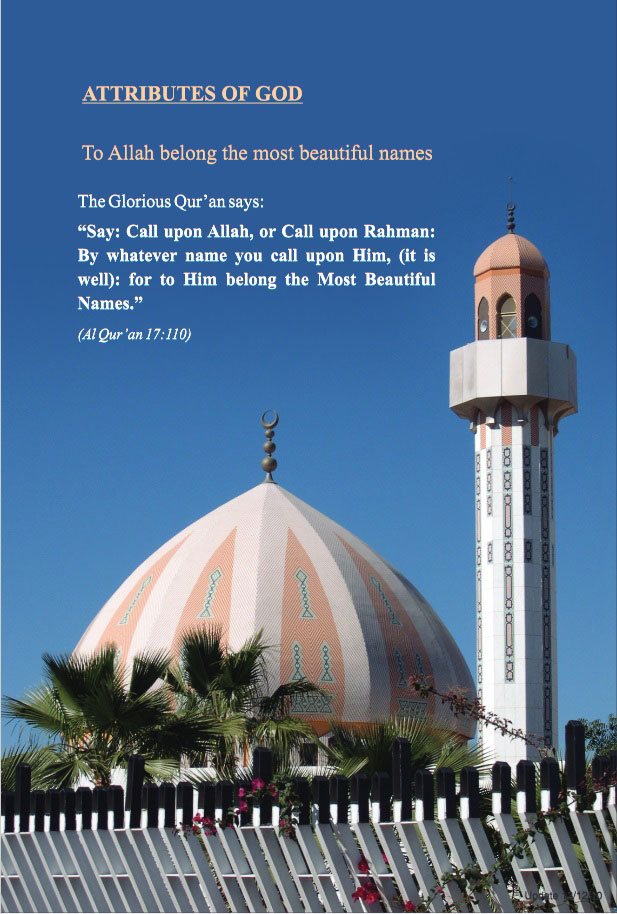
A similar message regarding the beautiful names of Allah is repeated in the Glorious Qur’an in Surah Al A’raaf 7:180, in Surah Taha 20:8 and in Surah Al Hashr 59:23-24.
The Qur’an and Ahadith give no less than 99 different attributes to Almighty God and the crowning one is Allah. The Qur’an refers to Allah as Ar Rahman (the Most Gracious), Ar Raheem (the Most Merciful) and Al Hakeem (the Most Wise) among many other names. You can call Allah by any name but that name should be beautiful and should not conjure up a mental picture.
Each Attribute of God is unique and possessed by Him alone
Not only does God possess unique attributes, but also each attribute of Almighty God is sufficient to identify Him. I shall clarify this point in detail. Suppose we take the example of a famous personality, say astronaut Neil Armstrong
If someone says Neil Armstrong is an American, the attribute of being American possessed by Neil Armstrong is correct but not sufficient to identify him. Similarly, Neil Armstrong is an astronaut. The attribute of being an astronaut is not unique to Neil Armstrong. To identify the person uniquely we must look for a unique attribute. For example, Neil Armstrong was the first human to set foot on the moon. So when one asks, who was the first man to set foot on the moon, the answer is only one, i.e. Neil Armstrong. Similarly the attribute of Almighty God should be unique e.g. Creator of the Universe. If I say creator of the building, it may be possible and true but it is not unique. Thousands of people can make a building, so there would be no difference between man and God. But each attribute of Allah points to none but Allah.
For example:
“Ar Raheem”- the Most Merciful
“Ar Rahman”- the Most Gracious
“Al Hakeem”- the Most Wise
One attribute of God should not contradict with other attributes
To continue with the earlier example, if somebody says Neil Armstrong is an American astronaut who was an Indian, the attribute (American astronaut) is correct but its associated quality (of being an Indian) is false. Similarly if someone says that God is the Creator of the Universe with one head, two hands, two feet, etc. The attribute (Creator of the Universe) is correct but the associated quality (in the form of human being) is wrong and false
All attributes should point to one and the same God
Since there is only one God, all the attributes should point to one and the same God. To say that it was an American astronaut who first set foot on the moon, but his name was Edwin Aldrin is wrong. Similarly to say that the Creator is one God and the Cherisher is another God is absurd because there is only one God with all these attributes combined together.
Unity of God
Some polytheists argue by saying that the existence of more than one God is not illogical. Let us point out to them that if there were more than one ‘God’, they would dispute with one another; each ‘God’ trying to fulfill his will against the will of the other ‘Gods’. This can be seen in the mythology of the polytheistic and pantheistic religions. If a ‘God’ is defeated or unable to defeat the others, he is surely not the one true God. Also popular among polytheistic religions is the idea of many Gods, each having different responsibilities. Each one would be responsible for a part of man’s existence e.g. a Sun god, a Rain god etc. This indicates that one ‘God’ is incompetent of certain acts and moreover he is also ignorant of the other “Gods’” duties and responsibilities. There cannot be an ignorant and incapable God. If there were more than one God it would surely lead to confusion, disorder, chaos and destruction in the Universe. But the universe is in complete harmony.
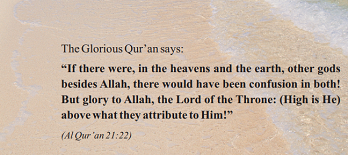
If there were more than one God, they would have taken away what they have created. The Glorious Qur’an says:
“No son did Allah beget, nor is there any god along with Him: (if there were many gods), behold, each god would have taken away what he had created, and some would have lorded it over others! Glory to Allah! (He is free) from the (sort of) things they attribute to Him!”
(Al Qur’an 23:91)
Thus the existence of one True, Supreme, Almighty God, is the only logical concept of God.
There are a few religions like Buddhism and Confucianism, which are agnostic religions. They do not comment on God. They neither confirm nor deny the existence of God. There are other religions like Jainism, which are atheistic religions and which do not believe in the existence of God. (Inshallah I shall be publishing a book “Is the Qur’an God’s Word?” which can Alhamdulillah prove the existence of Allah (swt) to an atheist or an agnostic by means of reason, logic and science on the basis of the Glorious Qur’an.)
ALL RELIGIONS ULTIMATELY BELIEVE IN MONOTHEISM
All major religions that believe in the existence of God ultimately, on a higher level, believe in one Supreme God. All religious scriptures actually speak about monotheism i.e. belief in the only one true God.
People change scriptures for their benefit
By the passage of time most of the religious scriptures have been distorted and changed by people for their own benefits. The creed of many religions has thus been distorted from monotheism to pantheism or polytheism. The Glorious Qur’an says:
“Then woe to those who write the book with their own hands, and then say: “This is from Allah,” to traffic with it for a miserable price! - Woe to them for what their hands do write, and for the gain they make thereby.”
(Al Qur’an 2:79)
TAWHEED
Definition and Categories
Islam believes in ‘Tawheed’ which is not merely monotheism i.e. belief in one unique God, but much more. ‘Tawheed’ literally means ‘unification’ i.e. ‘asserting oneness’ and is derived from the Arabic verb ‘Wahhada’ which means to unite, unify or consolidate.
Tawheed can be divided into three categories
(i) Tawheed Ar Ruboobeeyah
(ii) Tawheed Al Asmaa was Sifaat
(iii) Tawheed Al Ibaadah or Uloohiyah
a. Tawheed Ar Ruboobeeyah (Maintaining the Unity of Lordship)
The first category is ‘Tawheed Ar Ruboobeeyah’. ‘Ruboobeeyah’ is derived from the root verb ‘Rabb’ meaning Lord, Sustainer and Cherisher
Therefore ‘Tawheed Ar Ruboobeeyah’ means ‘maintaining the unity of Lordship’. This category is based on the fundamental concept that Allah alone caused all things to exist when there was nothing. He created or originated all that exist out of nothing. He alone is the Sole Creator, Cherisher and Sustainer of the complete universe and all between it, without any need from it
b. Tawheed Al Asmaa was Sifaat (Maintaining the Unity of Allah’s names and attributes)
The second category is ‘Tawheed Al Asmaa was Sifaat’ which means ‘maintaining the Unity of Allah’s names and attributes’. This category is divided into five aspects:
(i) Allah should be referred to as described by Him and by His Prophet (pbuh)
Allah must be referred to according to the manner in which He and His prophet have described Him without explaining His names and attributes by giving them meanings other than their obvious meanings.
(ii) Allah must be referred to as He has referred to Himself
Allah must be referred to without giving Him any new names or attributes. For example Allah may not be given the name Al Ghaadib (the Angry One), despite the fact that He has said that He gets angry, because neither Allah nor His messenger has used this name.
(iii) Allah is referred to without giving Him the Attributes of His creation
In reference to God, we should strictly abstain from giving Him the attributes of those He has created. For instance in the Bible, God is portrayed as repenting (1 Samuel 15:35) in the same way as humans do when they realize their errors. This is completely against the principle of Tawheed. God does not repent as He does not commit any mistakes or errors.
The key principle when dealing with Allah’s attributes is given in the Glorious Qur’an in Surah Ash Shoora:
“There is nothing whatever like unto Him, and He is the One that hears and sees (all things).”
(Al Qur’an 42:11)
Although hearing and seeing are human qualities, when attributed to the unique Creator, Almighty God - they are without comparison in their perfection, unlike when associated with humans who require ears, eyes, etc. and who are limited in their sight and hearing.
(iv) Humans should not be given any attribute of God
To refer to a human or for that matter any creation of God with the attribute of God is also against the principle of Tawheed. For example, referring to a person as one who has no beginning or end (eternal).
(v) Allah’s name cannot be given to His creatures: Some divine names in the indefinite form, like ‘Raoof’ or ‘Raheem’ are permissible names for men as Allah has used them for Prophets; but ‘Ar Raoof’ (the Most Pious) and ‘Ar Raheem’ (the Most Merciful) can only be used if prefixed by ‘Abd’ meaning “slave of” or “servant of”, i.e. ‘Abdur Raoof’or ‘Abdur Raheem’.





